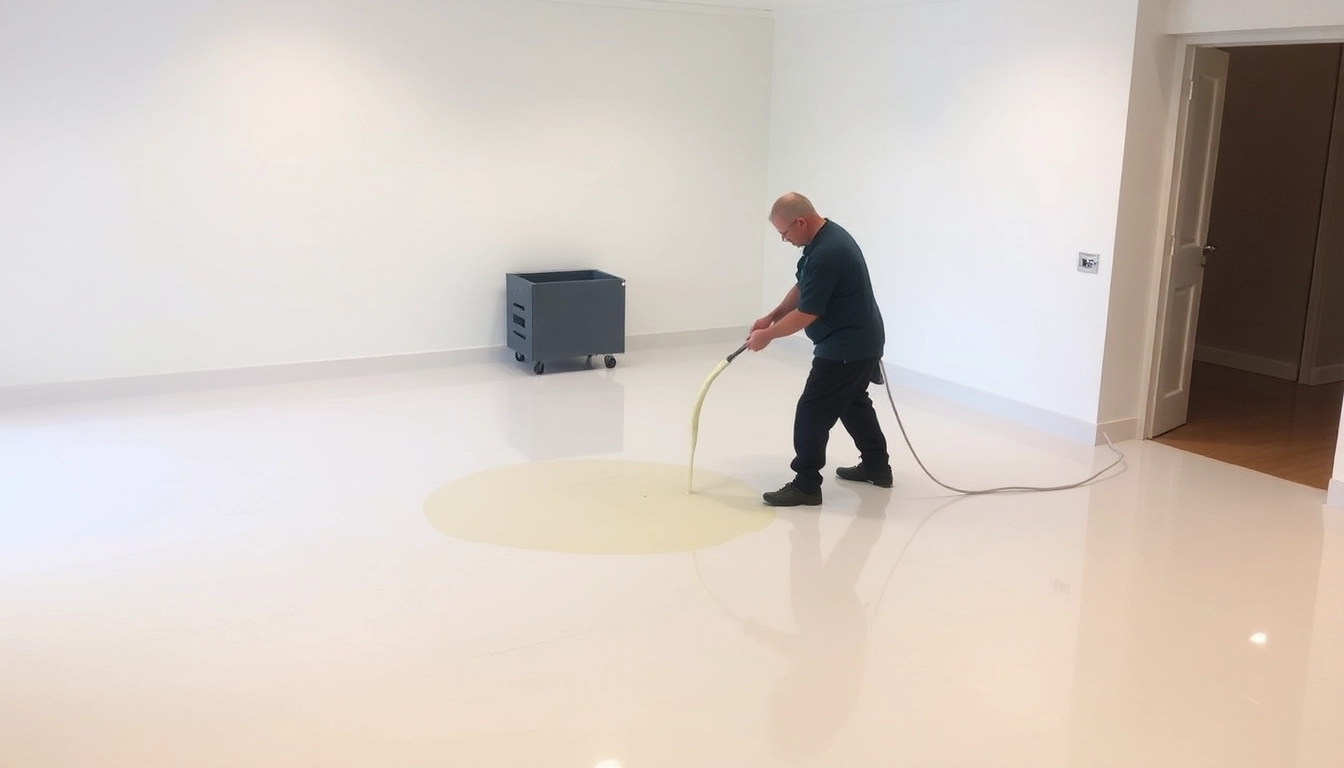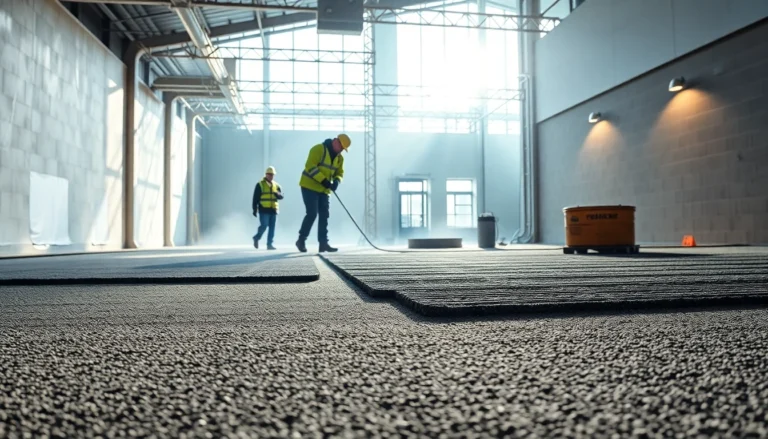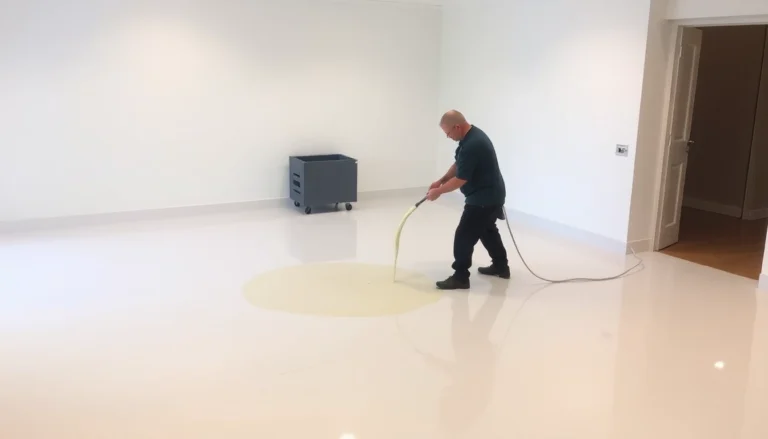
Understanding Liquid Screeding in Birmingham
In the realm of modern construction and renovation, achieving a perfectly smooth, durable, and efficient flooring surface is paramount. Liquid screeding has emerged as a leading choice for homeowners, contractors, and developers across Birmingham and the wider West Midlands. This advanced flooring solution offers faster installation times, superior surface quality, and improved thermal properties, making it particularly suitable for underfloor heating systems and versatile floor finishes.
For those embarking on property development or refurbishment projects, understanding the nuances of Liquid screeding Birmingham can be instrumental in ensuring your project’s success. This guide explores what liquid screeding entails, its variety, advantages over traditional methods, and practical insights into installation, maintenance, and future trends in Birmingham’s construction landscape.
What is Liquid Screeding and Its Benefits
Liquid screed is a high-flowing form of floor screed that is poured in a liquid state, allowing it to self-level and produce an exceptionally flat surface. Composed primarily of cement, fine aggregates, and often additives for enhanced performance, it differs significantly from traditional sand-and-cement screeds. Its fluidity facilitates quicker and more precise installation, especially over large areas or complex underfloor heating systems.
Among its many benefits, liquid screed provides superior thermal conductivity, making it ideal for underfloor heating, as it coats heating pipes uniformly, maximizing heat transfer and reducing warm-up times. Its rapid setting and drying times streamline construction schedules, lowering labor costs and minimizing project delays. Additionally, its self-compacting nature means fewer air pockets and inconsistencies, resulting in a smoother, more durable surface ready for tiling or other floor coverings.
Different Types of Liquid Screed Available in Birmingham
Various types of liquid screed cater to specific project needs, environmental conditions, and budget considerations. The primary categories include:
- Flowing Self-Compacting Liquid Screed: Designed for rapid application over large areas with minimal effort. Its self-levelling properties ensure an even surface, suitable for intricate underfloor heating systems.
- Fast-Drying Liquid Screed: Incorporates additives to accelerate drying, ideal for projects with tight deadlines.
- Lightweight Liquid Screed: Uses lightweight aggregates to reduce load-bearing requirements, suitable for upper floors or retrofit applications.
- Eco-Friendly or Sustainable Liquid Screeds: Employs reduced carbon cement or supplementary cementitious materials to minimize environmental impact, aligning with green building standards.
Leading suppliers in Birmingham, such as Liquid Screed Floors Birmingham and SD Liquid Screed Birmingham, provide tailored solutions encompassing these types, ensuring options are available to match project-specific requirements.
Why Choose Liquid Screed Over Traditional Methods
Opting for liquid screeding presents numerous advantages over traditional sand and cement screeds:
- Speed of Installation: Liquid screed can be poured over large areas in a fraction of the time required for traditional screeds, often complete within 24-48 hours.
- Enhanced Flatness and Smoothness: Its self-levelling nature guarantees a high-quality, flat surface, reducing the need for further grinding or levelling.
- Superior Thermal Conductivity: Ideal for underfloor heating, as it ensures even heat distribution and reduces warm-up times.
- Reduced Labour and Material Waste: Its pumpable consistency minimizes mix errors and waste, resulting in cost savings.
- Compatibility with Various Floor Coverings: Provides a solid base for tiles, wood, vinyl, or carpets, with minimal cracking or settlement issues.
Considering these benefits, many in Birmingham are transitioning to liquid screed to enhance their construction quality and project efficiency.
Best Practices for Installing Liquid Screeding in Birmingham
Preparing the Substrate for Optimal Adhesion
Preparation is crucial for a durable, well-adhered liquid screed layer. Ensure the substrate—be it concrete, existing screed, or subfloor—is clean, dry, and free of loose particles, oils, or contaminants. Light scarification or priming may be necessary to improve bonding, especially on older or uneven surfaces.
In Birmingham’s climate, controlling moisture levels is essential. Moisture barriers or sealers should be applied where needed, particularly in areas prone to dampness or condensation. Correct preparation reduces the risk of cracking, delamination, or other future issues.
Step-by-Step Installation Process
- Substrate Inspection and Preparation: Verify surface stability and cleanliness.
- Priming: Apply a suitable primer or bonding agent if specified by the screed manufacturer.
- Mixing: Use the recommended water-to-screed ratio, employing professional pumps for consistency and efficiency.
- Pumping and Pouring: Carefully pour the liquid screed, starting from one corner and working systematically to ensure even coverage.
- Screeding and Leveling: Allow the self-levelling action to produce a flat surface; additional manual smoothing is rarely needed but can be performed if necessary.
- Drying and Curing: Follow manufacturer guidelines for curing times, typically ranging from 24 hours for light traffic to several days for full strength.
Utilizing experienced local contractors like those listed on Screed It Birmingham ensures adherence to best practices and compliance with local building codes.
Common Challenges and How to Overcome Them
Although liquid screeding offers many advantages, common challenges include:
- Timing and Rapid Setting: Precise timing for pouring and finishing is essential to prevent cold joints or uneven surfaces. Using additives for faster setting can complicate installation if not managed properly.
- Moisture Control: Excess moisture can delay drying or cause surface issues. Adequate priming and environmental control mitigate this risk.
- Inconsistent Mixing or Pumping: Poor mixing ratios or subpar equipment can lead to segregation or air entrapment. Professional mixing and pumping solutions are recommended.
Partnering with reputable contractors familiar with Birmingham’s climate conditions and building standards reduces these risks, ensuring a flawless finish.
How to Choose a Reliable Liquid Screeding Contractor in Birmingham
Key Qualifications and Certifications to Look For
Experienced contractors should hold relevant certifications from recognized industry bodies, such as the British Board of Agrément (BBA) or similar standards in the UK. Accreditation guarantees compliance with safety, quality, and environmental regulations. Additionally, check that they possess the necessary insurance, especially for large-scale or complex installations.
Questions to Ask Before Hiring
Ensure you select the right team by addressing key questions:
- Can you provide references from previous Birmingham-based projects?
- What types of liquid screed do you recommend for my specific project?
- What is your estimated timeline and project cost?
- How do you handle site preparation and environmental factors?
- Are your technicians licensed and trained in the latest screeding technologies?
Assessing Past Projects and Client Reviews
Review portfolios and client testimonials to gauge the contractor’s expertise and reliability. Local providers with a solid reputation in Birmingham often showcase case studies demonstrating their ability to handle diverse projects—from residential homes to commercial developments. Visiting completed sites or requesting photos can provide tangible assurance of quality standards.
Maintenance and Longevity of Liquid Screed Floors
Tips for Proper Care and Cleaning
Liquid screed floors are relatively low-maintenance. Regular sweeping and damp mopping prevent dirt accumulation. Avoid harsh chemicals or abrasive tools that may damage the surface. For floors with tile or vinyl finishes, use cleaning agents recommended by the flooring manufacturer.
Signs of Wear and When to Refinish
Over time, signs such as cracking, surface wear, unevenness, or moisture penetration indicate the need for intervention. If the screed begins to delaminate or exhibits significant cracking, consulting a professional for assessment and potential refinishing or repair is advisable to prolong the floor’s lifespan.
Impact on Energy Efficiency and Heating Systems
Properly installed liquid screed enhances the efficiency of underfloor heating by providing an excellent thermal base. Regular maintenance of heating systems, combined with the high thermal mass of liquid screed, results in faster warm-up times, reduced energy consumption, and lower utility bills. Ensuring the screed remains intact and free of cracks supports optimal heat transfer over its lifespan.
Innovations and Future Trends in Liquid Screeding in Birmingham
Emerging Materials and Technology
Innovations include self-healing screeds with microcapsules that release repairing agents upon cracking, and ultra-fast-setting formulations that drastically reduce curing times. Additionally, ready-mixed, drone-delivered, or automated pump systems improve installation efficiency and precision, making liquid screeding faster and more reliable.
Environmental Considerations and Sustainable Options
The industry is increasingly adopting eco-friendly materials, such as low-carbon cements, supplementary cementitious materials (like fly ash or slag), and recycled aggregates. These innovations aim to reduce the carbon footprint of construction projects in Birmingham, aligning with the UK’s sustainability goals.
Integrating Liquid Screed with Smart Home Heating Solutions
The future points toward integrating liquid screeding systems with smart thermostats and IoT technology, enabling homeowners and building managers to optimize heating efficiency, monitor energy use, and enhance comfort. Birmingham’s growing smart city initiatives support the adoption of these innovative solutions, promising more energy-efficient and connected living environments.





